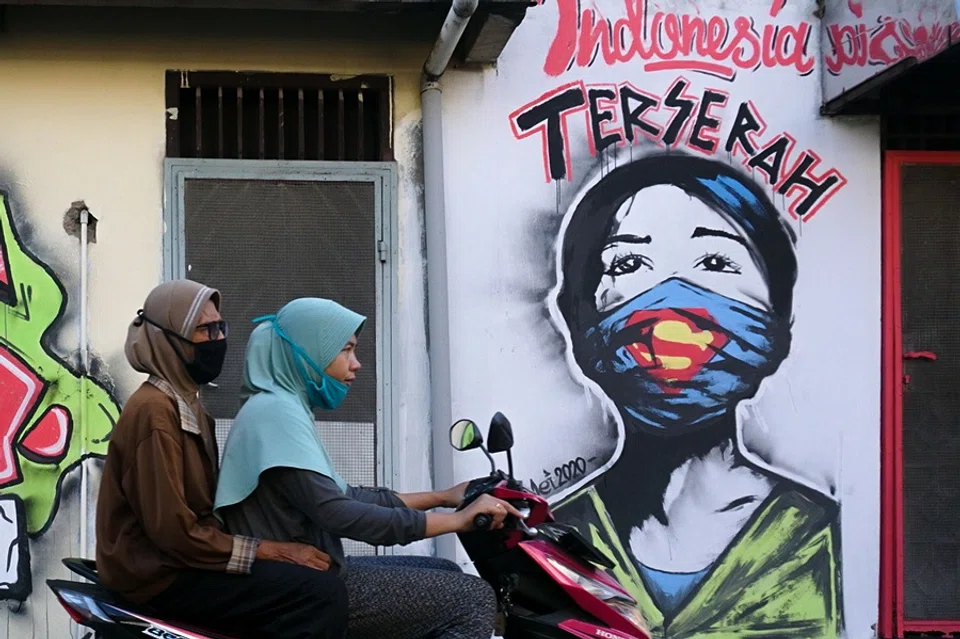Beyond ASEAN: More 'no-superpower coalitions' needed as US-China rivalry upsets global interests
With China more aggressive and the US more unpredictable, and both more unilateralist, the US-China rivalry has ended the post-Cold War order that benefited Southeast Asia and ASEAN. ISEAS academics Malcolm Cook and Hoang Thi Ha note that Southeast Asian states should consider joining more or establishing minilateral informal coalitions that do not include China and the US.

The last eight years have seen three key supports of the benign post-Cold War geopolitical order dissolve.
Since Xi Jinping took power in 2012, China has become a more aggressive international actor less accepting of limits on and demanding recognition of its superpower prerogatives. Beijing's refusal to abide by the 2016 Arbitral Tribunal ruling on the South China Sea under UNCLOS and its active campaign to undermine this legitimate use of international maritime law is a clear case in point. The personalisation of political power by Xi Jinping and the removal of a time limit on his presidency strongly suggest that Beijing will not deviate from this course.
Since January 2017, under President Trump, the US has become a much more unpredictable superpower that sees continued support for US-led global and regional institutions as detrimental. Trump's withdrawal of the US from the Trans-Pacific Partnership mega-regional trade negotiations in his first week in office was a harbinger of what has come. There is a strong bipartisan consensus, backed by public opinion, that China is a major threat to US paramountcy which needs to be countered.
Third, the US-China relationship has become one of unhidden and ideologically-empowered rivalry. Chinese foreign minister Wang Yi forewarns of a new Cold War. This rivalry has not caused the above changes in superpower behaviours; rather, these behaviours have made this rivalry more virulent.
This order provided the geopolitical foundation for ASEAN's expansion and the deepening of its dialogue relations, creation of wider ASEAN-led regional groupings, and aspirations to ASEAN centrality.
The ongoing global pandemic that originated in China and is hitting the US hard has aggravated each of these destabilising forces and their combined effect. China and the USA have eschewed cooperation for blaming each other. Trump reduced funding to the World Health Organization and announced his withdrawal from the organisation. The Xi administration wrongly interpreted Australia's call for an independent inquiry into the pandemic as an attack on China by a dependent US ally, and then threatened and imposed economic consequences.
These three geopolitical changes and their combined effect mark the end of the benign post-Cold War order that had benefited the countries of Southeast Asia, and focused interest in the region on ASEAN and the Association's ability to engage the US and China. This order provided the geopolitical foundation for ASEAN's expansion and the deepening of its dialogue relations, creation of wider ASEAN-led regional groupings, and aspirations to ASEAN centrality. The present and foreseeable future look more daunting for Southeast Asian states and for ASEAN.

Mistrust of Beijing and Washington
Wang Gungwu, an eminent historian of Southeast Asia, recently surmised about this emerging order in the article "Even If the West Has Lost Its Way, China May Not Be Heir Apparent" that countries may not see China replacing the US in its dominant role. And Southeast Asian policy elites seem to be in agreement, at least according to the State of Southeast Asia surveys conducted by ISEAS - Yusof Ishak Institute in 2019 and 2020.
China is not the favoured heir apparent. Southeast Asians are watching China's growing influence in the region with anxiety.
These surveys reflect an acute perception of America's declining regional influence under the Trump administration. The US was considered the most influential power in economic and political-strategic domains by only 7.9% and 26.7% respectively of the respondents in 2020, trailing far behind China. 47% expressed little or no confidence in the US as a strategic partner and provider of regional security, up from 34.6% in 2019. The US is indeed losing its way in Southeast Asia.
China is not the favoured heir apparent. Southeast Asians are watching China's growing influence in the region with anxiety. Only 1.5% of the respondents in the 2020 survey expected China to re-emerge as a benign and benevolent power, down from 8.9% in 2019. 79.2% viewed China as the most influential economic power but 71.9% of them were worried about its economic influence. Likewise, 52.2% considered China the most influential political-strategic power but an overwhelming majority of them (85.4%) were concerned about this. Despite all the diplomatic and financial capital that China has invested in promoting its Belt and Road Initiative (BRI) in the region, 70% of the respondents in 2019 thought that their governments should be cautious in negotiating BRI projects. In 2020, 63.6% were sceptical of China's new approach of an "open, clean, and green" BRI.
Respondents instead prefer looking within the region and to other major powers for mutual support.
China and the US are among the most distrusted major powers in the region, albeit for quite different reasons. The trust deficit in the US is mainly due to the concern that Washington is distracted with its internal affairs and cannot focus on global concerns and issues (42.8%). China is distrusted principally because it is feared that Beijing could use its economic and military power to threaten Southeast Asian nations' interests and sovereignty (53.5%).


Respondents instead prefer looking within the region and to other major powers for mutual support. The 2020 survey showed strong feelings on the need to strengthen regional resilience and unity, which came as the top option for ASEAN in the face of US-China rivalry (48%), followed by "not siding with China or the US" (31.3%) and "seeking out third-parties to broaden its strategic space and options" (14.7%).
Japan and the European Union (EU) are the most trusted powers, as indicated in the trust rankings. More specifically, the EU was the region's top choice for upholding the rules-based order and international law, followed by the US (24.3%) and Japan (20%). The region also looks to Japan (27.6%) and the EU (25.5%) for leadership in the global free trade agenda. The US and China registered only 14% each on this question.
ASEAN's utility and constraints
ASEAN still matters much for its member states and extra-regional partners. A cornerstone of the foreign policy of Southeast Asian states, ASEAN helps moderate the power asymmetry and historical problems among its members, providing the normative and institutional foundation for their friendly relations and cooperation. Since the end of the Cold War, ASEAN has also played a pivotal role in building an open and inclusive regional architecture that engages major powers from within and outside of the region through ASEAN-led platforms, including ASEAN Plus One, ASEAN Plus Three (APT), ASEAN Regional Forum (ARF), East Asia Summit (EAS), and ASEAN Defence Ministers Meeting Plus (ADMM-Plus).
Although the notion of "ASEAN centrality" is still subject to debate, all dialogue partners, including the USA and China, have professed support for ASEAN centrality in their policy statements.
These platforms enable regional states to enhance their agency, secure their autonomy, and promote their interests, while providing an anchor for external parties to engage with the region. Each of the 10 ASEAN dialogue partners - namely Australia, Canada, China, the EU, India, Japan, New Zealand, Russia, South Korea and the USA - have established dedicated missions to ASEAN. The UK, demonstrating its interest to join this club, opened its dedicated mission to ASEAN last year. Meanwhile, the EU and Canada - the two dialogue partners still left out of the EAS and ADMM-Plus - have made their cases for participation in these two premier regional strategic-security mechanisms.
ASEAN meetings and processes have dominated discussions of foreign policy and geopolitics in Southeast Asia. Although the notion of "ASEAN centrality" is still subject to debate, all dialogue partners, including the US and China, have professed support for ASEAN centrality in their policy statements.
The worsening US-China rivalry gives rise to legitimate concerns over the future of multilateralism and global governance, but ASEAN's ability to address these is limited, due to the presence of China in all ASEAN-plus platforms, and of the USA in all but one.

The current changes to the regional order are increasing pressure on ASEAN institutions by complicating decision-making processes and institutional outcomes. Since ASEAN works by consensus, this principle also applies to the broad and diverse membership of ASEAN-plus mechanisms. This means moving ahead at a pace comfortable to all in good times, and in bad times, muddling in limbo.
For instance, the granting of the observer status in the ADMM-Plus to the UK, France, Canada and the EU - all of which are considered as aligned with the US - is at an impasse due to China's and Russia's opposition. The worsening US-China rivalry gives rise to legitimate concerns over the future of multilateralism and global governance, but ASEAN's ability to address these is limited, due to the presence of China in all ASEAN-plus platforms, and of the USA in all but one.

ASEAN remains the anchor of an open and inclusive regional architecture that helps its member states resist increasing bipolarisation in regional politics.
There is no scope for new ASEAN-plus processes that do not include China and the US. It is therefore important that Southeast Asian states use ASEAN platforms with other dialogue partners more for middle power cooperation and diplomacy. Southeast Asian leaders could leverage ASEAN+1 summits, especially with the EU and Japan, to express concerns over China, the US, their rivalry and implications for the region, and discuss coordinated action on issues of common concern.
ASEAN remains the anchor of an open and inclusive regional architecture that helps its member states resist increasing bipolarisation in regional politics. However, as Drew Thompson argues, "The shortcoming of the analogy of having to choose sides between China or the US is that there is one grand decision to be made... Making choices is also not an all-or-nothing decision between the US or China, nor is it strict neutrality and nonalignment.
Southeast Asian states instead will make many choices based on how they define their own societal, economic and security interests, and in many cases those choices could align with either the US, China or Japan or the EU on any given issue."
How Southeast Asian states will make these choices, be it on the provider of their 5G networks, the builder of their new ports and high-speed trains, or the supplier of their next arms procurement, will depend on the availability of options. These do not have to be limited to the US or China. The ISEAS surveys suggest these other options would be particularly welcome.
In response to the pandemic and the US-China rivalry, a number of new informal issue-specific coalitions of action or support that do not include the US or China have been formed with states across the world choosing to join.
New options
Crises expose the shortcomings of the present and engender new forms of cooperation between affected parties. The G20 grouping was a direct response to the 2008 global financial crisis originating in the US and the shortcomings of the Atlanticist G7 grouping. Indonesia was the only Southeast Asian state to have been invited to this larger grouping of systemically important states. In response and to influence the G20 process, Singapore took the lead in organising the Global Governance Group of 30 small- and medium-sized powers not invited to the G20.
To combat the pandemic
The coronavirus pandemic has exposed the global governance failings due to the US-China rivalry which has been made worse by the pandemic. In response to the pandemic and the US-China rivalry, a number of new informal issue-specific coalitions of action or support that do not include the US or China have been formed with states across the world choosing to join. These include:
• The Ministerial Coordination Group on Covid-19 including Indonesia, Singapore, the United Kingdom, Canada, Australia, Germany, Italy, Morocco, South Africa and Peru formed to share information on the pandemic and pandemic responses.
• On 25 March, Singapore, Brunei and Myanmar along with Canada, Australia, New Zealand and Chile, issued a joint statement committing them to keeping supply chains open during the pandemic.
• On 4 May, the EU Union co-convened a Coronavirus Global Response pledging event with Canada, France, Germany, Italy, Japan, Saudi Arabia, Norway, Spain and the UK. It raised $8 billion for "collaborative development and universal deployment of diagnostics, treatments and vaccines against coronavirus".
• By 17 May, 62 states cooperated to support the EU draft motion at the World Health Assembly for an "impartial, independent and comprehensive evaluation of the WHO-coordinated international health response to COVID-19". Indonesia was the only Southeast Asian state in this successful coalition of support. The initial action by this core group of countries eventually succeeded in mobilising more than 130 countries behind this probe. This global expression of support took place despite, or maybe aided by, Beijing's excessive and punitive response to Australia's earlier calls for an investigation into the pandemic.
Beyond the pandemic
Examples of responsive small and middle power cooperation to address the destabilising actions of China and the US and their rivalry extend beyond the pandemic. Most recently, on 23 May, the foreign ministers of Canada, Australia and the UK issued a joint statement of concern over the threat to Hong Kong's autonomy.
In October 2018, in the face of the Trump administration's actions undermining the World Trade Organization, the Ottawa Group for WTO Reform held its first meeting in Canada's capital. This globe-spanning group consists of Singapore, Canada, Australia, Brazil, the EU, Japan, Kenya, South Korea, Mexico, New Zealand, Norway and Switzerland.
As the US-China rivalry deepens and expands, more such informal, issue-specific coalitions that do not include either superpower will be required to protect participating states' shared interests, and the regional and global multilateral institutions placed under strain by China, the US, and US-China rivalry. The two ISEAS surveys showed that the policy elites across Southeast Asia which participated in it recognised this and the need to act on it.
This article was first published as ISEAS Perspective 2020/63 "Beyond China, the USA and ASEAN: Informal Minilateral Options" by Malcolm Cook and Hoang Thi Ha.






![[Photos] Fact versus fiction: The portrayal of WWII anti-Japanese martyrs in Taiwan](https://cassette.sphdigital.com.sg/image/thinkchina/3494f8bd481870f7c65b881fd21a3fd733f573f23232376e39c532a2c7593cbc)